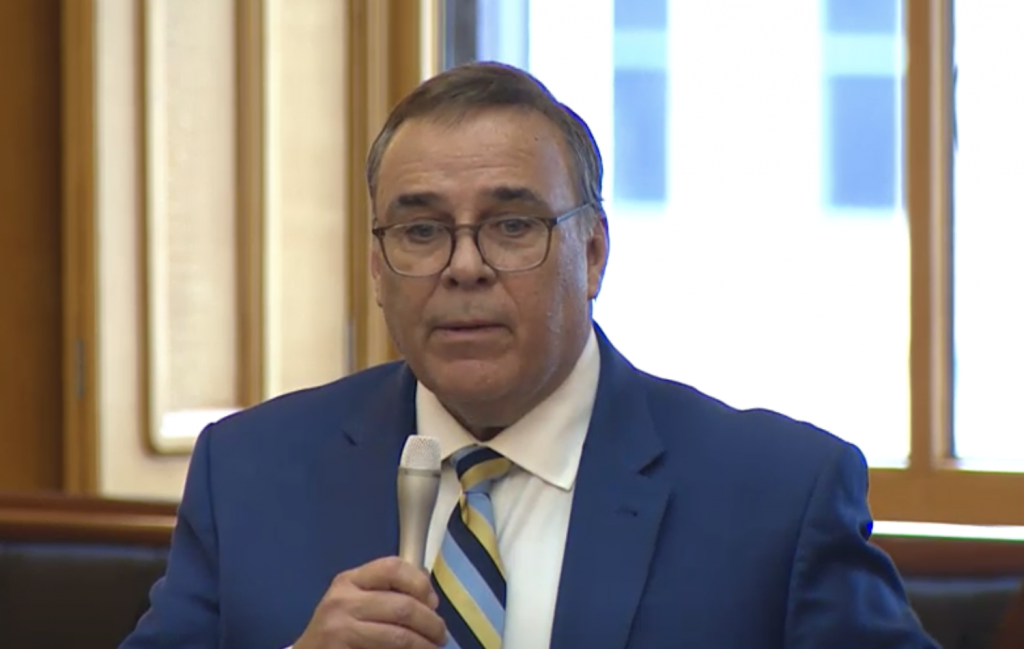Ohio Sports Betting Bill Passed by State Lawmakers, Now Heads to Governor’s Desk
Posted on: December 8, 2021, 04:20h.
Last updated on: February 6, 2022, 06:55h.
Ohio is on the verge of becoming the 33rd state to legalize sports betting. On Wednesday, both chambers of the state legislature overwhelmingly passed House Bill 29. That’s after a conference committee of lawmakers from the House and Senate agreed on the legislation.

After votes of 31-1 in the Senate and 72-12 in the House, the bill now heads to the desk of Gov. Mike DeWine (R). He has expressed previously he would sign the proposal into law.
If that happens as expected, it would end years of discussions among lawmakers in Columbus and set the stage for a launch no later than Jan. 1, 2023. However, state officials are hopeful the first bets will be placed well before that time.
The bill establishes three types of licenses to offer sports betting. It allows for more than 40 brick-and-mortar sportsbooks across the state. In addition, at least 25 mobile licenses will be made available, with Ohio’s casinos, racinos, and professional sports teams eligible to partner with operators on those. Also, certain by-the-drink liquor establishments will be able to host kiosks.
While kiosks will be operated by the Ohio Lottery, the state’s Casino Control Commission will have regulatory authority over sports betting.
Long Time Coming
After competing bills in the House and Senate failed to make it out of the legislature last year, Ohio lawmakers hit the reset button as they entered a new two-year session in January.
Senate Majority Floor Leader Kirk Schuring, R-Canton, took over leadership on the bill and became chairman of a special committee on gaming that met for weeks to receive testimony from key stakeholders and interested parties. The goal was to set up a free-market sports betting system that included retail sportsbooks throughout the state.
In mid-June, the Senate passed a sports betting bill by a 30-2 margin. The hope was that the House would take it up quickly and pass it before the summer recess. When the odds for that diminished, Schuring and other Senate leaders took HB29, which at the time was a bill regarding identification cards for veterans, and included the sports betting language in that.
House leaders, again though, declined to act, forcing the need for a conference committee.
House Majority Floor Leader Bill Seitz, R-Cincinnati, said leaders from both chambers have held discussions for six months and the final bill was the result of about 50 amendments.
Among the amendments the conference committee approved was one that did away with requirements for official league data to score proposition bets. Sports betting operators have typically opposed such mandates because of the costs associated with subscriptions to official data feeds.
Second Mobile Skins Available for Some
The conference committee also extended the time frame for licenses from three years to five. The members also expanded access to a retail sportsbook license. Previously limited to counties with a population of 100,000 or greater, the final bill allows for a brick-and-mortar sportsbook in a county with a population of at least 50,000 – provided that county had at least 5 million tourism visitors in the most recent calendar year.
According to the 2020 US Census, 27 of Ohio’s 88 counties had at least 100,000 residents. More than half, 49 in total, exceed 50,000.
Previous versions of the bill limited the mobile app licenses to 25. But the new bill gives the state some flexibility there and the possibility to add more.
Each of the four casinos, seven racinos, and nine professional sports teams (including the PGA Tour’s The Memorial Tournament) will be allowed to apply for a mobile and retail license. Lawmakers, though, included a provision that would allow some of those operators to secure a second mobile license, under certain circumstances.
You can’t get the second skin, unless you can show the Ohio Casino Control Commission that it will bring incremental economic benefit to the state, and it won’t prevent another Type A licensee from getting their mobile application,” Schuring said.
That provision would allow gaming companies that have agreements with multiple operators to potentially secure licenses and fulfill those arrangements. Some operators hold multiple licenses. Penn National Gaming operates two casinos and two racinos and JACK Entertainment operates a casino and racino.
At the bars, kiosks will also be limited to just offering moneyline, spread, and total bets on games, Seitz said. Parlays on kiosks will also be limited to a maximum of four games or events.
Ohio Expects Millions in Sports Betting Taxes
With a population of 11.8 million, Ohio would become the fourth-largest state in the US to legalize sports betting, behind New York, Pennsylvania, and Illinois. Lawmakers in Florida, the nation’s third-largest state, approved statewide sports betting as part of an amended gaming compact with the Seminole Tribe. But a federal judge nullified that agreement. The tribe is currently appealing that order.
So, Ohio could find itself among the nation’s leading sports betting markets fairly quickly once operators get the green light to launch.
According to the fiscal note on the conference committee bill, the Ohio Legislative Budget Office expects the state’s sports betting market, “after several years of operation,” to be around $3.35 billion.
The bill calls for a 10 percent tax on gaming receipts, defined as revenue substracted by paid winnings and voided bets. In 2027, sports betting operators would also be able to subtract a portion of their promotional credits from their pre-tax receipts.
If operators launch in January 2023, the budget office forecasts operator revenues of about $74 million and state tax receipts of $7.4 million. By the 2024 fiscal year, which may likely be the first full year for sports betting, the budget office expects operators to generate more than $240 million in revenue and $24 million in state taxes.
All but 2 percent of the state tax money would go to an education fund, with the 2 percent going to a problem sports betting fund. Some licensing fees would be directed to a fund for veterans.
Related News Articles
Most Popular
FTC: Casino Resort Fees Must Be Included in Upfront Hotel Rates
Genovese Capo Sentenced for Illegal Gambling on Long Island
NBA Referees Expose Sports Betting Abuse Following Steve Kerr Meltdown
UPDATE: Former Resorts World & MGM Grand Prez Loses Gaming License
Most Commented
-
UPDATE: Whiskey Pete’s Casino Near Las Vegas Closes
— December 20, 2024 — 30 Comments -
Caesars Virginia in Danville Now Accepting Hotel Room Reservations
— November 27, 2024 — 9 Comments -
UPDATE: Former Resorts World & MGM Grand Prez Loses Gaming License
— December 19, 2024 — 8 Comments -
FTC: Casino Resort Fees Must Be Included in Upfront Hotel Rates
— December 17, 2024 — 7 Comments
















No comments yet